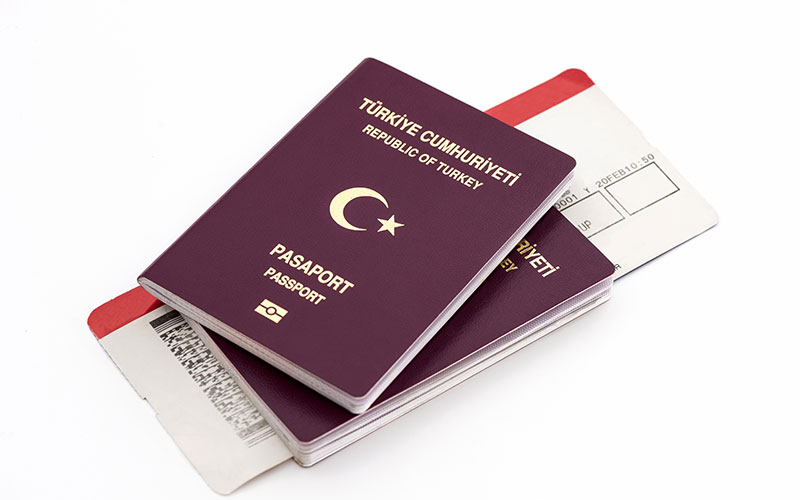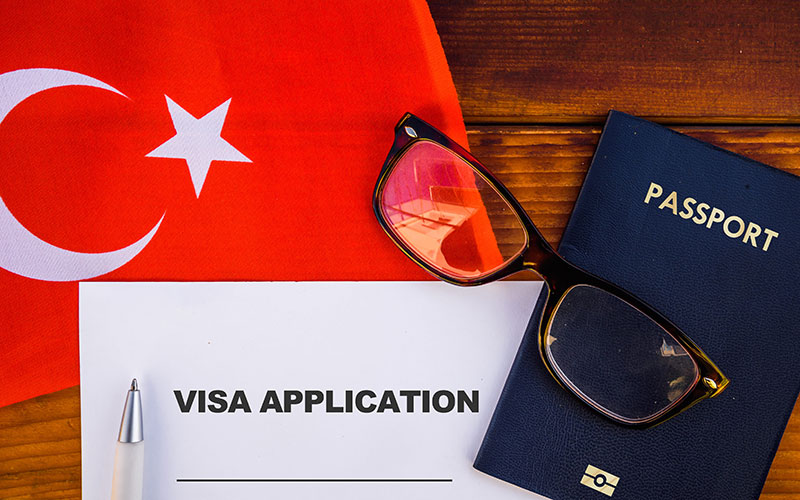Learn About The Visa Policy of Turkey
Do I Need a Turkey Visa?
Turkey makes the procedure easy for foreign tourists to increase the tourism revenue. Essential documents such as passports and Turkish visas provide legitimate entry. Access is denied without them. However, some countries have visa-free access to Turkey, making travel easier for their citizens. Before applying for a Turkey visit visa, whether it is a single entry visa for Turkey or a multiple entry visa for Turkey, know your eligibility criteria before availing of a visa.
What Sets Apart an Official Passport from an Ordinary Passport?
The Ordinary Passport, put simply, is a travel certificate granted by the international bodies for utilization by persons to democratize travel abroad. Such passports incorporate the holder’s personal details from name to date of birth, and photograph, to passport number. An official passport on the contrary is granted to government employees & officials while touring abroad on any official business. An official passport earmarks the bearer as advocating for their country; it does not typically carry any special privileges.
Which visa one must attain to tour Turkey?
Before setting off on an expedition to Turkey, you should time check whether you still require a traditional visa, transit visa for Turkey, e-visa, or exemption from visa needs. Turkey and Northern Cyprus dwellers can freely cross in and out of Turkey without permission for any cause. Nationals of other countries may/may not need a visa resting on Turkey’s diplomatic relations with that distinctive country amid other factors. Many countries can attain e-visa via online application. The 40 countries plus territories highlighted under permit their passport holders to register for online e-Visas before travel for a nominal fee. The stay time legitimate for most of these nationalities is about some 90 days (with reductions for some to about 30) in any period spanning 180 days.
The country list incorporates,
- United States
- Spain
- Saudi Arabia
- Portugal
- Taiwan
- Poland
- Oman
- Norway
- Netherlands
- Mexico
- South Africa
- Malta
- Maldives
- Jamaica
- Ireland
- Suriname
- Indonesia
- Haiti
- Fiji
- Mauritius
- Dominican Republic
- Dominica
- Cyprus
- Saint Vincent & Grenadines
- Croatia
- China
- Canada
- Grenada
- Australia
- Belgium
- Barbados
- Saint Lucia
- Bahrain
- Timor-Leste
- Bahamas
- Austria
- Armenia
- Antigua and Barbuda
Also, citizens of these 63 territories/countries can apply for a Turkey e-Visa for a single-entry and stay for up to 30 days for tourism or business purposes.
- Zimbabwe
- Zambia
- Yemen
- Vietnam
- Uganda
- Togo
- Tanzania
- Switzerland
- Sri Lanka
- Vanuatu
- Somalia
- Sierra Leone
- Senegal
- Sao Tome & Principe
- Rwanda
- Solomon Islands
- Republic of Congo
- Philippines
- Nigeria
- Niger
- Nepal
- Namibia
- Palestine
- Mozambique
- Mauritania
- Mali
- Malawi
- Madagascar
- Libya
- Liberia
- Lesotho
- Kenya
- Iraq
- Guinea-Bissau
- Guinea
- Ghana
- Gambia
- Pakistan
- Gabon
- Ethiopia
- Eritrea
- Equatorial Guinea
- Egypt
- Democratic Republic of Congo
- Djibouti
- Ivory Coast
- Comoros
- Chad
- Central African Republic
- Cabo Verde
- Cameroon
- Cambodia
- Burundi
- Burkina Faso
- India
- Botswana
- Bhutan
- Benin
- Bangladesh
- Angola
- Algeria
- Afghanistan
These conditions pertain to citizens touring Turkey from certain countries.
- Specific countries must possess a residence permit plus a valid visa to be more specific: from Ireland, the UK, and the US (member countries of the Schengen Area).
- Tour Turkey via a flight possessing protocols with the eminent Turkish Ministry of Foreign Affairs. Philippines, Pakistan, India, Bangladesh, and Afghanistan citizens are exempt from satisfying such conditions.
- Possess required fiscal means and hotel reservation
- Algeria nationals should fall under age group spanning 18-35 years.
Where an e-visa can be issued?

The visa can be obtained from your definitive country’s embassy, but you have to apply a minimum of about a month earlier than leaving. Alternatively, one may opt for a more instant solution by registering for an electronic visa online, which is obtainable to specific countries visiting Turkey for business/tourism purposes.
Visa-Exempt Countries for Turkey
Those with ordinary passports require a visa to enter Turkey.
Europe
- Ukraine
- Serbia
- Montenegro
- Monaco
- Moldova
- Kosovo
- Georgia
- Bosnia and Herzegovina
- Belarus
- Albania
Americas
- Peru
- Ecuador
- Brazil
- Bolivia
Asia
- Uzbekistan
- Thailand
- Taiwan
- South Korea
- Singapore
- Mongolia
- Malaysia
- Macao
- Kyrgyzstan
- Kazakhstan
- Japan
- Hong Kong
- Azerbaijan
Africa
- Tunisia
- South America
- Sao Tome & Principe
- Morocco
- Mauritius
- Gambia
- Eswatini (Swaziland)
- Botswana
Oceania
- Vanuatu
- Micronesia
- Fiji
Caribbean
- Vanuatu
- Trinidad and Tobago
- St Vincent & the Grenadines
- Saint Lucia
- Saint Kitts & Nevis
- Jamaica
- Haiti
- Grenada
- Dominica
- Barbados
- Antigua and Barbuda
Territories
- Turks & Caicos Islands
- Niue
- Hong Kong
- Cook Islands
- British Virgin Islands
Standard requirements for a Turkey visa application

Below are the standard documents required to apply for a Turkey visa, but note that these documents may vary depending on your visa type and purpose of travel. The consulate has all the rights to ask for additional documents.
- Your passport or travel document must have at least six months of validity and for at least 90 days after exit. It must also consist of a minimum of two blank pages, the first of which must include personal data.
- Previous visas (if any)
- Duly signed and completed Turkey visa application form, along with two biometric photos not older than six months
- Financial proof showing you have enough funds to cover your entire stay in Turkey.
- Proof of occupation in the form of certified documents like an employer letter, a student certificate, a document or registration, or proof of pension funds
- Proof of accommodation through hotel reservations or an invitation letter that covers your stay in Turkey
- Documentation of health travel insurance covering every medical emergency during your stay in Turkey
Additional documents based on your employment status
- Employed
Employment contract, the original certificate of employment demonstrating your position in the company, and the salary.
Bank account statements or slips for the last six months
Turkey Visa Letter of Introduction
Income Tax Return (ITR) Certificate
- Self-Employed
Valid trade license for your company (company registration)
Bank account statements or slips of the company for the last six months
Income Tax Return (ITR) Certificate
- Unemployed
Proof of financial sources to cover your visit to Turkey
Proof of sponsorship in the case where the person is not able to fund his or her expenses for the trip
- Retired
Documentation of the pension statement for the last six months
In addition to these, you must provide additional documents on the following:
Turkey visa for European countries
Official and ordinary passport holders of the EU member states fall under the category of visa-exempt countries and can visit Turkey for up to 90 days with a valid period of 180 days
Turkey visa for Russian nationals
For up to 60 days, Russian citizens are not required to have a visa in order to travel to or from Turkey for business, tourism, or transit.
These were the basic and additional requirements to apply for a Turkey visit visa. When applying for a Turkey visa, make sure you conduct thorough research on your travel and visa requirements, which will help you get hassle-free approval. You can also avail the benefits of e-visa single entry or multiple entry by applying it online. In the case of uncertainty, details on how to renew or extend Turkey visa, or more consult an expert to guide you through the visa application process.
Turkey Visa Fees
Turkey charges different visa fees based on nationality and visa type:
- US Citizens – $60 for multiple-entry e-visas valid for 180 days
- UK Citizens – $20 for single-entry e-visas valid for 180 days
- EU Country Citizens – Generally, there is no fee for 90-day tourist stays.
- Australian Citizens – $60 for multiple-entry e-visas valid for 180 days
In some cases, longer validity or multiple entry visas carry higher fees. Applications requiring manual approval may also have extra processing fees.
You can make the payment using a credit card or debit card. They also support PayPal. This is a non-refundable fee, regardless of your visa outcome.
FAQs
1. How long does it take to get an e-visa approved?
Most Turkish e-visa applications are processed automatically within 24 hours or less if all information meets routine expectations. Applicants submitting further documentation can expect up to 72 hours via email support.
More intensive manual reviews for complicated visa cases could take up to five full business days or longer in some situations. Consulate letters, health checks, and translations may be requested in these special instances.
2. Can I get a visa on arrival?
Citizens of some countries, like India and China, are eligible for visas on arrival at Turkish airports and some land borders. However, this generally comes with bureaucratic hassles and high last-minute fees.
Unless absolutely necessary, applying in advance online is recommended, especially as arrival visa rules can change abruptly. Having a pre-approved e-visa provides peace of mind for arrival immigration checks.
3. Can I extend my Turkish visa?
Many types of short-term Turkish visas can indeed be extended once within Turkey. Local immigration authorities allow tourist and business e-visa holders to extend up to an extra 90 days, provided their initial stays were less than 90 days.
Longer 6- or 12-month residency permits would require applying at a Turkish consulate in advance rather than extending. Similarly, those planning to work, study, or receive medical care should use appropriate long-stay visas.
4. Can I visit Northern Cyprus with my Turkish e-visa?
No, you can’t. The de facto Turkish Republic of Northern Cyprus is considered separate from the mainland for immigration purposes. All foreign visitors must obtain a visa specifically issued from Northern Cyprus border control points.
These visas allow stays of up to 90 days and can be extended locally. Entry stamps would only be valid for Northern Cyprus until exiting back into Turkey. Tourists should prepare to present passports and purchase visas on arrival after any ferry or flight.
5. Do I need travel insurance to get a visa for Turkey?
Turkey does not explicitly require proof of travel insurance in order to issue standard tourist and business e-visas. However, having adequate medical and emergency coverage is still highly recommended while visiting the country with a Turkey business visa or tourist visa.
In practice, many immigration officers do not ask to see any travel insurance. Out-of-pocket health costs in Turkey can vary greatly, so uninsured visitors take on financial risks for injuries or sudden illness.
6. What are the countries that I can explore using Turkey’s multiple entry visa?
Countries to Visit with a Turkey Multiple Entry Visa includes those within Turkey from Bursa to Istanbul, Turkish Riviera to Cappadocia, and more and also beyond the country.



